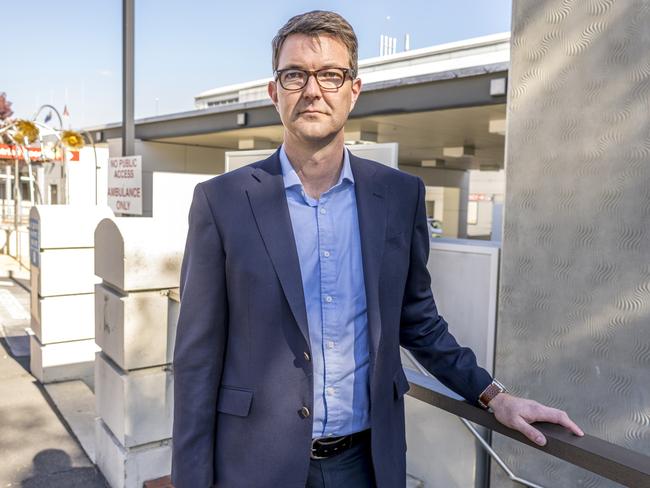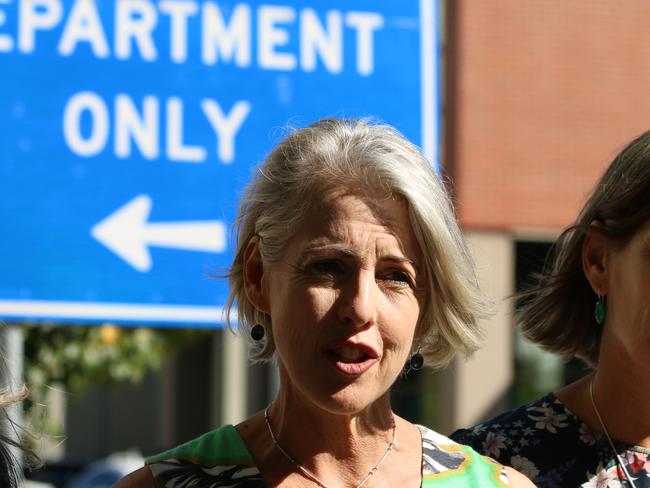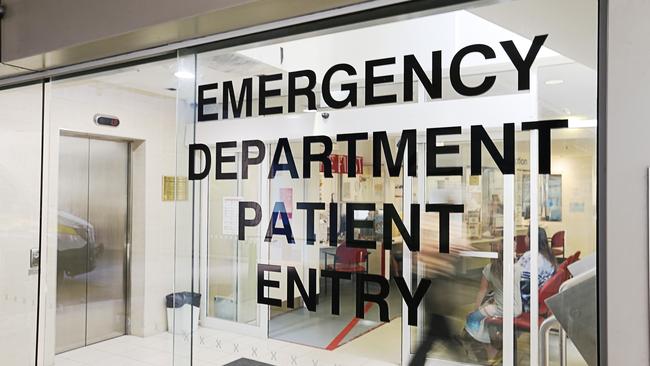Political parties make a pitch for state’s health vote
Liberals, Labor and the Greens have pledged hundreds of millions of dollars to fix the state’s ailing health system. Here they deliver their pitch to voters as health experts weigh in with their thoughts.
Politics
Don't miss out on the headlines from Politics. Followed categories will be added to My News.
WITH the state’s struggling health system a major focus of the 2021 state election campaign, health experts and the state’s three political parties deliver their appeal to voters.
Questions over Liberals’ credibility on health
MARTYN GODDARD
Health is traditionally a strong point for Labor and a weak one for the Liberals. In few elections has that been more evident than in this one.
Liberals first. Their core problem is the unanswerable question that dogs every policy announcement – why didn’t you do this years ago?
Their secondary problem, also concerning credibility, is the incoherence of many of their proposals – figures that don’t add up, uncertainty about when projects will actually be delivered, and concerns about the practicality of some promises.
The centrepiece is yet another elective surgery blitz – their fourth since coming to office – that cannot work because there is nowhere to perform that many operations. Public hospitals are full and private hospitals are busy with people unable to access the public system.
Labor’s policies, in glaring contrast to their offerings at recent elections, could begin the long process of renovating our rickety health system.
Establishing a second Hobart hospital campus at the old Repatriation site, is essential. So is a completion and execution of the much-delayed master plan for the Launceston General Hospital.
The Labor pitch, importantly, addresses out-of-hospital care – essential but currently near-invisible. This means turning our 17 small hospitals into genuine community health centres, establishing 30 new centres, revamping ambulance services, reconstructing preventive services, boosting mental health care and giving the Mersey a new and permanent role.
It’s potentially as important to this state as Medicare was to the nation. The problem is whether, above the factional hubbub, anyone notices.
Martyn Goddard is a health policy analyst.
SARAH COURTNEY
HEALTH continues to be an absolute priority for the Tasmanian Liberals. Last year was a year like no other, and we acted decisively to keep Tasmanians safe.
Through the incredible work of our professional healthcare staff across the state, and with the support of the community, we came out of the pandemic with great strength, and Tasmania is now one of the safest places in the world.
The Liberals are the only party with a fully costed and detailed plan to tackle the elective surgery waiting lists following COVID-19, supported by comprehensive, affordable investments in crucial community services – palliative care, oral health, after-hours services and hospital equipment.
Our $156.4 million elective surgery plan will deliver an additional 22,300 elective surgeries and endoscopies across the state.
In contrast, Labor are keeping their surgery number a secret.
Our bolstered second stage of the RHH redevelopment will deliver new facilities sooner, including an expanded ICU, better cancer services, and a new Older Persons Unit.
The second stage of the Kingston Health Centre – not matched by Labor – is a crucial investment that will meet the needs of this growing region, including consideration of a hydrotherapy pool.
Further, our $580 million LGH redevelopment is the biggest ever investment in that hospital, delivering much-needed space, as well as major redevelopments for the North West Regional Hospital and Mersey Community Hospital to boost their facilities.
Sarah Courtney is Tasmania’s health minister.
Real people suffering under health neglect
BASTIAN SEIDEL
LABOR does not believe that funding our health system is a cost.
Paying our nurses, doctors, paramedics and the many other health professionals well is a genuine investment. An investment to the benefit of all Tasmanians who may need an ambulance, or may need to be treated in our hospitals.
The Liberal government has cut $1.6 billion from health since 2014. And Tasmanians are paying for this irresponsible government with their lives.
Behind the horror stories reported almost daily in our newspapers are real people. People who have suffered, people who have died far too early because of the lack of ambulance services, because of unacceptable waiting lists.
Labor will offer permanent positions to over 73 medical doctors in our hospitals, so they are not forced to move interstate or into private practice after they have qualified as specialist consultants.

We are committed to employ over 325 nurses, nurse practitioners and remote-area nurses, so our community health centres and rural district hospitals become vibrant centres of community health again after years of neglect by Liberal spin doctors.
We will ensure that each and every ambulance station is staffed by paramedics 24/7. Heart attacks do not make appointments and emergency services need to be available anywhere and anytime.
We will ensure that all communities have access to allied health practitioners and mental health social workers, by offering them permanent positions in our communities.
We will also fast-track the Repat Hospital Masterplan in order to create 85 additional beds, a day surgery centre and mental health precinct.
Labor’s health plan is evidence-based, supported by the health professions and is what Tasmanians have been asking for.
Dr Bastian Seidel is Labor’s health spokesman.
Critical shortfall in nurses and a cliff is coming
ROSALIE WOODRUFF
AFTER seven years under-investment, Tasmania’s health measures have slipped further behind the rest of the country.
Tasmanians have more chronic and complex care needs than any other state. Every year, about 5000 extra Tasmanians need to visit a hospital.
Our ambulances are slower and ramped too long, we have dangerously long elective surgery waiting lists, blocked emergency departments, and preventive and community health services have withered.
Hard-working, dedicated hospital and paramedic staff are over-stretched and stressed, with our major hospitals over capacity.
It doesn’t have to be this way. Quick-fix Band-Aids and broken election promises have been a fixture in Tasmania.
We will fund 50 allied health staff and preventive health services in regional communities, to keep people well and manage chronic disease. This takes the pressure off ambulances and emergency departments, and means fewer people end up needing elective surgery.

Our investment in 224 extra paramedics, 34 new vehicles, and four new ambulance stations will get people to hospital faster.
There is a critical shortfall in nurses in Tasmania now, and a cliff is coming. The Liberals’ decision not to invest enough in recruiting, training and employing nursing staff has left hospitals unable to fill shifts. Our plan invests in 600 extra graduate nurses, 120 permanent nurses and midwives, and their training.
We will pay for our health investment by taxing big corporates, like mining, fishing and pokies barons.
No person should be suffering because donors’ interests are being put first.
Dr Rosalie Woodruff is the Greens health spokeswoman
Investment is great, but where are the staff?
JUAN CARLOS ASCENCIO-LANE
THE Australasian College for Emergency Medicine welcomes, and supports, all policies relating to further investment in public heath, particularly those relating to emergency medicine.
But more is needed.
We’ve seen health infrastructure announcements. Fine. But where will the staff come from? The parties need genuine plans to fix the workforce crisis.
We’ve seen a lot of focus on reducing elective surgery wait times. This is important, but more important is a whole-of-system approach that addresses both acute and elective flow.
Parties need to look at the whole health system. Too many Band-Aids have been applied, without long-term goals. The health workforce is tired of remedies that look good in the media, but don’t fix the system. Tasmanians deserve better.
Tasmania is suffering from a pandemic of hospital overcrowding, ambulance ramping and bottle necks (access block) for admission. It’s worse here than any other state. If you need help and arrive at an access-blocked emergency department – which all Tasmanian EDs usually are – you are 10 per cent more likely to die.

And it’s getting worse. In the past 10 years, the number of people coming to EDs for help and needing hospital admission for further care has increased by 75 per cent. Meanwhile, the number of beds has risen by only 17 per cent. This causes delays for patients needing admission, overcrowding and longer ED waits. Access block is a health-system-wide problem manifest in EDs.
The policies offered so far won’t solve these problems.
What will?
The emergency physicians of Tasmania – the people who care for you when you most need it – want parties to commit to opening another 100 general medical beds within the next year, and a total of 300 by 2024. And these need to be staffed.
Governments must also set targets for reducing ramping, overcrowding and access block to meet national benchmarks – at the barest minimum.
This is, literally, a life-and-death matter. We can’t wait.
Dr Juan Carlos Ascencio-Lane is the Tasmania Faculty Chair of the Australasian College for Emergency Medicine


